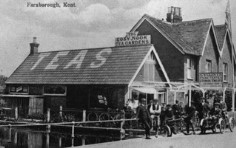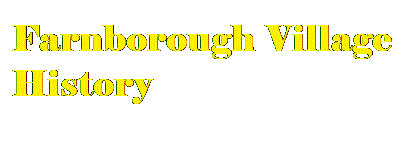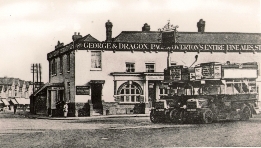


1. THE DAY WAR BROKE OUT MY MOTHER SAID TO ME …………
Wartime memories of Farnborough Kent children
by Jocelyn Russell – nee Palmer. Guelph, Ontario, Canada. November 2004
| I remember the day war broke out. I was six and my brother John
was almost two. I know it was a Sunday as both my parents were home. I
was helping my mother to wash and cut the runner beans for midday dinner
when the siren sounded. My Mum and Dad upended the settee against an
inner wall and John and I were told to crouch under it. We thought this
was quite fun and pretended we were mice hiding from the cat. When the
all-clear sounded we all came out again. That was the first of many
warning sirens, and even today, I cannot hear the wail of a “Moaning
Minnie” without feeling I should take cover somewhere. We lived close to RAF Biggin Hill – the fighter aerodrome just over two miles away across the fields from my home at number 65 Bassets Way in Farnborough. Its Spitfires and Hurricanes fought intruding German aircraft above our Farnborough skies as part of the Battle of Britain that raged from July to October 1940. It was probably the most important event in the history of the Royal Air Force to this day. I know that Norman Bath who lived next door to me and his friends found the dog fights high up in the sky above the village very exciting to watch. But not me!! We had an above ground brick built shelter in the garden at the side of the house. It wasn’t a corrugated sheet steel below ground level Anderson Shelter like some of the neighbours. It would probably have protected us from flying debris, but would certainly not have withstood a direct hit. There were three bunks – one on top of the other. I had the top one, John the middle and Mum the bottom one. There was also room for a couple of chairs and if there was an air raid warning we would be joined by a couple of elderly ladies. Mrs Hill and I believe Mrs Clayton. I would smuggle some cocoa in a marmite jar and a cookie to take to bed with us and John and I would enjoy a “midnight feast” at 9 o’clock which was the latest we could manage to stay awake after going to bed. We also spent many nights tucked away in a cupboard under the stairs, which was probably a much safer place than the shelter. When I travelled up to London after the war on a number 47 double deck red bus, I realised how fortunate we had been in Farnborough as in London there were so many bombed out houses with just the inner wall and stairs still standing. My mother used to hear me say my prayers until I was about seven or eight. I used to pray, “……. God bless soldiers, sailors and airmen…..” One night I asked her whether that included the Germans. After a pause she said yes, so I always did. I could not bring myself to sing “Now thank we all our God,” with the rest of the class when the pocket battleship“Graf Spee” was scuttled by its German Captain Langsdorff following the Battle of the River Plate in December 1939. I was worried about what had happened to the sailors aboard her. There was no formal evacuation order for Farnborough’s children. At some point during the Battle of Britain my mother took my brother and I up to South Yorkshire to stay with various relatives. I went to three different schools during that time in Stainforth, Thorpe Hezley and Carlton (Notts.) and missed out on learning long division of pounds, shillings and pence. I did manage to work it out myself. How much easier it would have been with decimal currency. At the school in Carlton, when the register was taken in the morning, we were supposed to reply “Yes Madam.” Since I thought that only the Queen, King George VI’s wife, should be addressed that way, I never replied. “Madam” got used to my silence and never complained, after all, what would a little evacuee know about the proper way to address a teacher? My great Auntie Grace only ever served one dessert – rice pudding with no raisins or spice. I’ve refused to eat it ever since and it was the one thing my mother never insisted I eat. As a child, my brother John suffered badly from bronchitis and after a particularly bad bout my mother took him home again. A bomb dropped on the then empty land opposite our house in Bassett’s Way. It remained there unexploded, until the bomb disposal squad dealt with it. I didn’t know about this until I came home again and saw the crater still there. Have you ever experienced communal panic? I have! I was at Farnborough Junior School, then on Starts Hill, when the air raid warning went. We all went down into the underground shelter beneath the middle playground between the Junior and Infants departments. We were sitting on the wooden benches when Mrs Moat our teacher tried to instil some order. A V1 or Doodlebug, a small-unmanned German aircraft with a large bomb at its nose came overhead and the engine cut out which meant it was on its way down. Everyone, children and adults, dived under the benches. It was so instinctive. I think we all felt silly afterwards, but self-preservation is a strong driving force. We heard later that the V1 had ended up in a farmer’s field and killed a cow. When the Doodlebugs and V2 rockets became a real nuisance, we went to Yorkshire again. Norman and Janet Bath came with us. I think Janet wasn’t too unhappy, but poor Norman was miserable. The childless couple he stayed with had no idea how to keep a young boy happy and occupied. I was perfectly happy, but then, I was with relatives I had met before. Auntie Grace’s rice puddings had not improved or diminished, but Uncle Bernard who worked at the pit head at the local coal mine, was great fun to play clock golf and housey-housey with. I joined the Girl Guides a little earlier than most. I was ten and getting a little bored. I was enjoying my own version of dancing round the mushroom when Brown Owl pulled me firmly out of the otherwise decorous circle and informed me in no uncertain terms that it was time I joined the Guides. And next week that’s where I was! This led to my first trip to Darrick Woods swimming pool with the Guides to learn to swim. I was late arriving at the meeting place at the Starts Hill Road end of Lavibonds Avenue, but hung around anyway. The siren went, an enemy plane came over and I dived into the middle of the largest bush I could see. We had heard of children being machine-gunned. I don’t know whether that had really happened but I wasn’t prepared to take any chances. The plane passed over, the all-clear went and the countryside was serene again. Yes I did eventually learn to swim. |
That event reminds me of the time I was scrambling through
the brush in the Toronto’s Don Valley in Canada where I’ve lived
since the 1960’s. There was a red-tailed hawk – a member of the
buzzard family – and I wanted to find out whether there were
young in the nest. There certainly were and both the male and
female started to dive-bomb me, getting ever closer. Once again
I found myself diving into a bush and there, just a foot away
from me was a yellow-throated warbler. We looked at each other
and both stayed exactly where we were until after about five
minutes the hawks settled down and we both quietly and
inconspicuously went our separate ways. Johnnie Grant lived in a house on the corner of Starts Hill and Bassets Way and in his front garden was a green painted board on a post that by changing colour was supposed to let us know whether there was poison gas in the area. The Germans had used poison gas in the First World War. Many people alive in Farnborough at that time could remember gas attacks and were frightened that it would be used again against civilians with devastating results. I never knew what colour the board was supposed to change to, but I always peered at it closely every time I went by. My grandfather’s bike shop “G.W. Palmer and Son” was located on Mason’s Hill in Bromley not far from the South Station. One evening after Grandpa George left for home – on his bike of course – a bomb fell and the shop was flattened. A lucky escape! The business moved to what had been stables at the foot of Mason’s Hill close to where the Habitat store now stands and where the 94 bus turned to go to Croydon. I remember how cold and draughty it was there. It was a number of years later that the bombsite was rebuilt and granddad’s shop returned to its original location. The shop was eventually renamed “Palmer Cycles.” As cars took over as a major form of transportation, other items were stocked. I worked here in Canada with an architect named Lionel, from Beckenham. He bought his angling equipment and his son’s first bike from there. Lionel’s Dad was killed when a bomb fell on the restaurant where he had been eating with friends. The friends left and Lionel’s Dad was paying the bill. He was the only one killed. My Dad started his war service in the Royal Artillery but was later transferred to the Royal Electrical and Mechanical Engineers or R.E.M.E. when they realised that by profession he was an electrical engineer. A little before D-Day my dad was home on leave from the army and told my Mum that he would probably be going overseas in the next little while. I asked him to bring me back a flower. I will never forget his expression of tenderness and wry amusement as he asked me whether I wanted one in a pot. I said no, just a daisy or buttercup to slip in his pocket. He agreed to do that if at all possible. I only half realised at the time that what I was really saying was “Come home Daddy!” On the bright sunny morning of June 6th 1944, my mother and I were at the breakfast table. I don’t know where my little brother John was. On the 8 o’clock news the newsreader announced that allied troops had landed in France. My mother got straight up from the table and hurried to the door. Her face was set like stone as she passed our window. I sat at the table and cried. Later we found that Dad did not go overseas. He was involved in the development of radar and the powers that be decided he was far more use working on that than being sent overseas. He used to bring notebooks home with “Secret” in red printed on them. They were tossed into the boiler and burnt. He was promoted to Staff Sergeant and besides listening for beeps; he dealt with many of the soldier’s personal problems. I remember that one time when he was on leave he took my brother and myself to the pictures to see “The Wizard of Oz.” There was a long queue, but when they saw my Dad in uniform, everyone insisted that we go right to the head of the queue. I felt very proud but I still get shivers when I think of those days. I didn’t hear anything about his work on radar until many years after the war and all he said then was that he had spent many hours listening to little beeps as tanks and soldiers went marching by. While my Dad was away in the army we had lodgers – one at a time. Two were bed-ridden old ladies who disappeared as mysteriously as they had arrived. Our favourite was Miss Morgan, a young woman from Wales who taught at Farnborough Infants School. Mary Morgan had a great sense of humour and we spent many hilarious evenings around the front room fire toasting cheese, while she read aloud from the series of books about Mary Plain from the bear pits of Berne. Mary was engaged to a pilot who was based at Biggin Hill. One day my mother told me never to mention him again….. I assume he had not returned from a sortie over Germany. She returned to Wales after two years in Farnborough to nurse her father who was dying of the “miners’ disease.” She married a fellow teacher when she was in her forties. They had no children. In one of her letters she said that the time she spent in Farnborough were the happiest years of her life. I was in touch with Mary until her death a few years ago. Towards the end of the war we often used to see Italian prisoners of war moving freely around Bromley High Street. One afternoon, walking to the bus stop from Bromley County Grammar School for Girls in Nightingale Lane, I passed a group of German prisoners doing some roadwork. They were laughing and one was saying “Nein, nein, nein!” He glanced my way and caught my eye and we laughed and smiled at each other. It was difficult to reconcile the human face of the “enemy” and the activities of war. Well, I think that’s the most vivid of my war memories. My sister-in-law once wondered why the subject turned up so often in conversation between my brother John and myself. I don’t think that anybody who has not experienced war as we did as children can possibly comprehend how much it influenced our lives one way or the other. I do know that it was my memories that led me to write to Prime Minister Jean Chretien to thank him for not involving Canada – my home country now – in the war against Iraq. It fills me with sorrow to think of all those Iraqi children (and those in other parts of the world.) whose lives are being affected by far more terrible things than I ever experienced. |
Next Chapter Back to Introduction